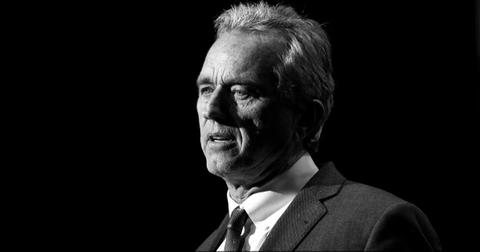Robert F. Kennedy Jr. Is Pretty Open About His Rare Voice Disorder
"There's a treatment for it: Botox shots," Robert once said when asked how he treats his voice disorder.
Jun. 28 2024, Updated 10:31 a.m. ET

Robert F. Kennedy Jr. most certainly carries the weight of his family's name.
As the third child of Robert F. Kennedy and nephew to Ted Kennedy and former president John F. Kennedy, politics is almost part of his DNA. Robert was only 9 years old when JFK was assassinated and barely had time to recover before his own father was killed while running for president, four years later.
The Kennedy family has been at the center of many conspiracies and controversies, which must make someone prepare for almost anything.
And it's obvious that when it comes to the Kennedys, almost anything can happen. Bizarre tragedies plague this family but not all of their issues are dire. According to media outlets Robert F. Kennedy Jr. suffers from a rare voice disorder that makes it difficult to speak at times.
Here's what we know about the disease — and what Robert has said about his voice.

What voice disorder does Robert F. Kennedy Jr. have?
According to ABC News, Robert F. Kennedy Jr. suffers from "spasmodic dysphonia, a specific form of an involuntary movement disorder called dystonia that affects only the voice box." This is not a life-threatening illness but it can certainly affect one's quality of life.
Other people who have it say "losing your voice hits people in their primary, intimate connection to the outside world and affects nearly every aspect of their lives."
In a conversation with Oprah Winfrey for the February 2007 issue of O, The Oprah Magazine, Robert went into detail regarding the rare disorder.
"The disease didn't hit me until I was about 43. I used to have a strong voice," he revealed. While it doesn't hurt, it certainly makes life a bit more complicated.
In the beginning, his symptoms were slight and came in the form of a "mild tremble for a couple of years." Evidently, they shouldn't worsen, but Robert believes his did.
How does one treat spasmodic dysphonia?
"There's a treatment for it: Botox shots. They put a needle into your voice box every four months," shared Robert.
The National Institute on Deafness and Other Communication Disorders also lists behavioral therapy (voice therapy) as a way to treat spasmodic dysphonia. However, this should be done in conjunction with Botox injections.
While there are surgical options available, the results are usually temporary. Dr. Robert Bastian, a former spokesman for Dysphonia International, told ABC News that "If you do anything surgical, the dystonia tries to win. It tries to figure out a way around its obstruction." Unfortunately, the cause is unknown which might explain why treatment is difficult to pin down.
For now, the "best guess spasmodic dysphonia experts have ... is that root of the neurological disorder lies in the basal ganglia," which is often referred to as the "processing area" of the brain.
Thankfully, organizations like Dysphonia International are "dedicated to improving the lives of people affected by spasmodic dysphonia and related voice conditions through research, education, awareness, and support," per its website.